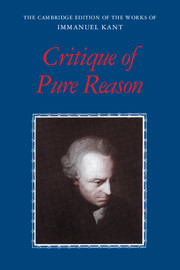Book contents
- Frontmatter
- Contents
- General editors' preface
- Acknowledgments
- Introduction
- Immanuel Kant, Critique of Pure Reason
- I Transcendental doctrine of elements
- Division one. Transcendental analytic
- Book I Analytic of concepts
- Chapter I On the clue to the discovery of all pure concepts of the understanding
- Chapter II On the deduction of the pure concepts of the understanding
- Book II Analytic of principles
- Appendix: On the amphiboly of concepts of reflection
- Remark to the amphiboly of concepts of reflection
- Division two. Transcendental dialectic
- II Transcendental doctrine of method
- Editorial Notes
- Glossary
- Index
Chapter I - On the clue to the discovery of all pure concepts of the understanding
from Book I - Analytic of concepts
- Frontmatter
- Contents
- General editors' preface
- Acknowledgments
- Introduction
- Immanuel Kant, Critique of Pure Reason
- I Transcendental doctrine of elements
- Division one. Transcendental analytic
- Book I Analytic of concepts
- Chapter I On the clue to the discovery of all pure concepts of the understanding
- Chapter II On the deduction of the pure concepts of the understanding
- Book II Analytic of principles
- Appendix: On the amphiboly of concepts of reflection
- Remark to the amphiboly of concepts of reflection
- Division two. Transcendental dialectic
- II Transcendental doctrine of method
- Editorial Notes
- Glossary
- Index
Summary
If one sets a faculty of cognition into play, then on various occasions different concepts will become prominent that will make this faculty known and that can be collected in a more or less exhaustive treatise depending on whether they have been observed for a longer time or with greater acuteness. Where this investigation will be completed can never be determined with certainty by means of this as it were mechanical procedure. Further, the concepts that are discovered only as the opportunity arises will not reveal any order and systematic unity, but will rather be ordered in pairs only according to similarities and placed in series only in accord with the magnitude of their content, from the simple to the more composite, which series are by no means systematic even if to some extent methodically produced.
Transcendental philosophy has the advantage but also the obligation to seek its concepts in accordance with a principle since they spring pure and unmixed from the understanding, as absolute unity, and must therefore be connected among themselves in accordance with a concept or idea. Such a connection, however, provides a rule by means of which the place of each pure concept of the understanding and the completeness of all of them together can be determined a priori, which would otherwise depend upon whim or chance.
- Type
- Chapter
- Information
- Critique of Pure Reason , pp. 204 - 218Publisher: Cambridge University PressPrint publication year: 1998

